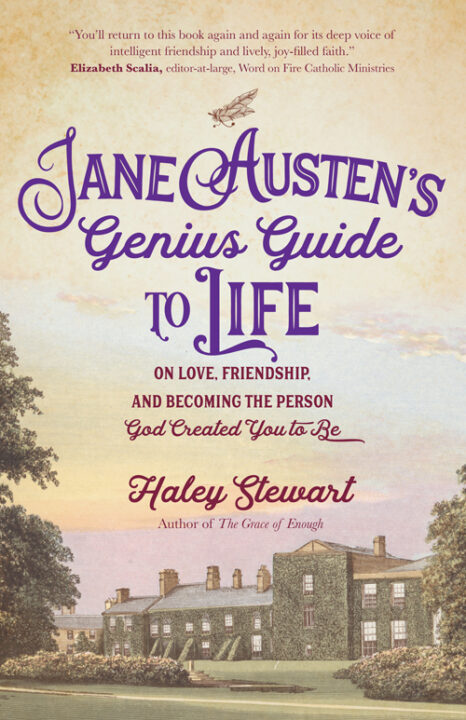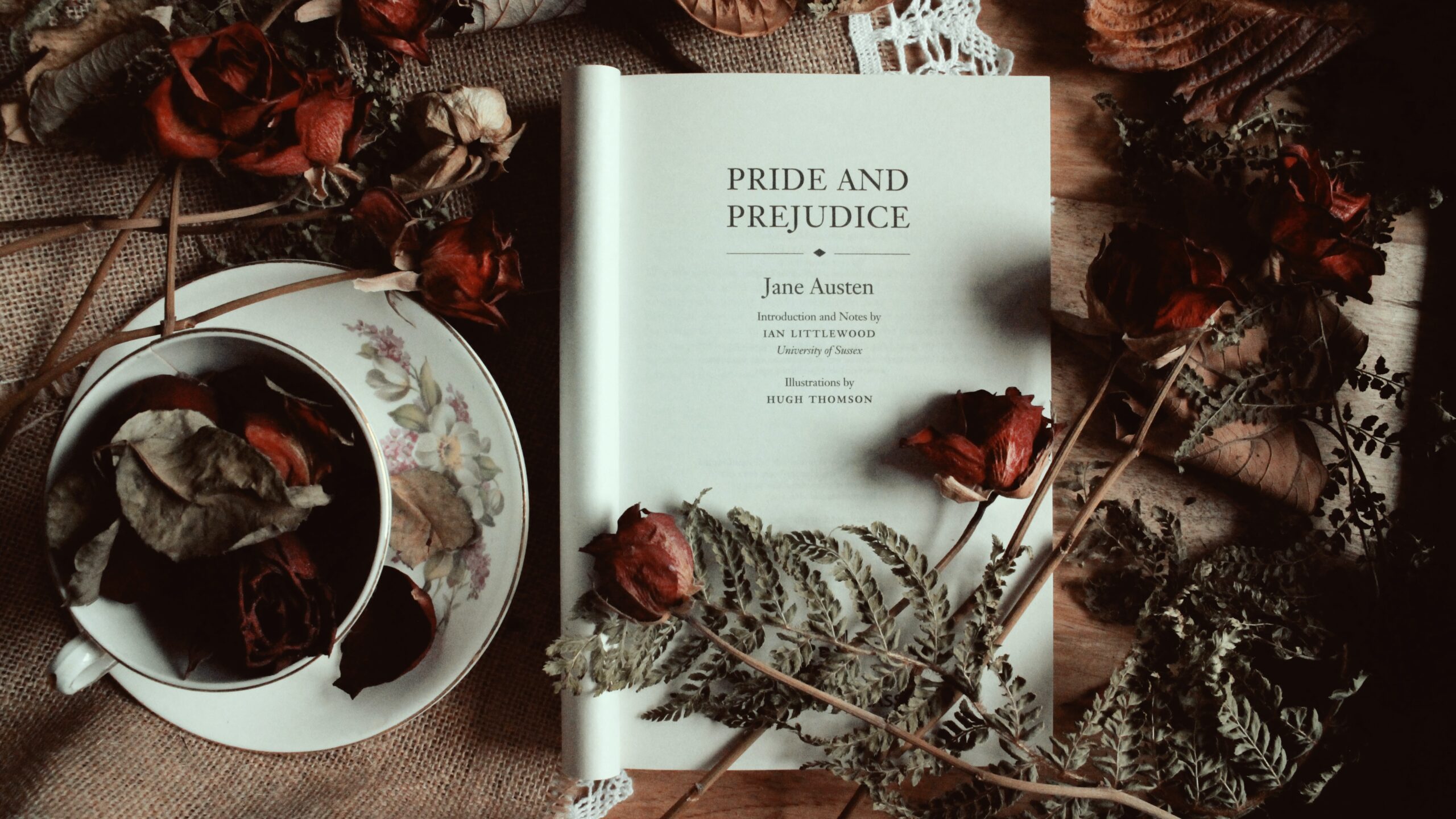British novelist Jane Austen is well-known for her wit, her brilliant portrayal of romance, her social commentary, and her strong female protagonists. But Austen’s moral landscape, deeply rooted in the traditional Christian understanding of vice and virtue, is to me her most fascinating legacy. Jane Austen was a practicing Christian, participating in corporate worship as well as private devotion and prayer. While Austen is repulsed by any self-righteous gesturing of clerics and laypeople, she was the proud daughter of an Anglican clergyman. In other words, as Dr. Cornel West points out, she was a “preacher’s kid”! Perhaps Jane Austen’s Christianity is often downplayed because her characters don’t share emotional religious fervor in their conversations or pray aloud (although they do refer to God). But she wrote original prayers, and the little worlds she creates in her novels are saturated with Christianity. We don’t see her faith displayed in passionate speeches of religious devotion from her characters. Austen’s faith is instead communicated in the way she builds her novels on the Christian tradition of virtue. If we ignore the influence of Christian faith on devoutly Anglican Jane Austen, we will fail to understand her.

Austen builds a world that is interested in the questions both philosophers and the Christian faith seek to answer: What is the self? What are human beings designed to be? What is a good person? How do good people behave? How do they fail to live well? Can a flawed soul be transformed into something better? What does that transformation look like? For Austen, the virtues are paths on our journey toward holiness. And we are all called to be holy because that is what God created us to be.
My name, Haley, comes from the Old English word for “whole.” Think “hale and hearty” (whole and healthy). It’s also connected to the Old English word for “holy” or “sacred,” hallowed—they have the same root.
God wants us to be holy because he wants us to be whole, to be fully ourselves as he designed us to be. Sin disfigures our souls, holding us back from this wholeness, or holiness, that God desires for us. Sin also distorts the way we understand the world, preventing us from having the clear soul-vision we need to live out our purpose: to love well. Our vices are failures to love, which in turn prevent us from being truly good.
God wants us to be holy because he wants us to be whole, to be fully ourselves as he designed us to be.
What makes someone a good person is one of the deepest questions of the human soul. Today, there is a strong aversion to the idea that certain actions are objectively right or wrong, leaving even professing Christians choosing the more socially acceptable path of moral relativism: “Who can say?” But Austen disagrees with this modern claim that there is no right answer. She subscribes to a Christian tradition of objective morality that teaches that it’s possible to know what is right and that we have the freedom to choose it. And that assent to moral objectivity is part of what keeps us reading her novels, creating new film adaptations, and discussing her exploration of ancient traditions of virtue. We get lost in Austen’s works in no small part because we long for a world in which it is possible to know what is right, how to behave, and what we want to become. Austen’s characters are familiar with the social conventions of their time—what fork to begin a meal with, what words to say in polite conversation, and what clothes to wear. But this isn’t why we are drawn to them. We want to inhabit a world in which the deep moral choices of how human beings ought to act are—although not always easy—clear.

Austen’s engaging novels show us that exploring the idea of virtue is anything but boring! Austen handles weighty moral philosophy with the light touch of joy and laughter. Catholic writer G.K. Chesterton notes that her early, unpublished writings were thought “not sufficiently serious” by her surviving relatives, but he reflects that “greatness is not made up of serious things, in the sense of solemn things.” Austen’s work has depth, but it is never solemn. Chesterton argues that she wrote under “the gigantic inspiration of laughter.” And her laughter echoes even now in the pages of her books. Her novels are full of comically awkward situations and side-splittingly funny characters. Anthony Trollope, a British novelist writing at the end of the nineteenth century, wrote, “The letters of Mr. Collins, a clergyman in Pride and Prejudice, would move laughter in a low-church archbishop.”
But it is partly Austen’s structure of both internal virtue and the public expression of virtue (how we interact with other people) that provides so much of the humor. In a short essay about Austen, Anglican apologist and Oxford Inkling C.S. Lewis muses, “The hard core of morality and even of religion seems to me to be just what makes good comedy possible. ‘Principles’ or ‘seriousness’ are essential to Jane Austen’s art. Where there is no norm, nothing can be ridiculous.” If there are no principles that dictate how we ought to behave toward one another, then no behavior can be wise or foolish. By placing her characters in the Christian tradition, Austen has a whole world of humor to engage. In Pride and Prejudice, Mr. Bennet remarks, “For what do we live, but to make sport for our neighbors, and laugh at them in our turn?” Austen is the queen of pointing out the ridiculous—not merely in others, but more importantly in ourselves. In this, she is very much a Christian artist. Chesterton reminds us, “Angels can fly because they can take themselves lightly. This has been always the instinct of Christendom, and especially the instinct of Christian art.”
We get lost in Austen’s works in no small part because we long for a world in which it is possible to know what is right, how to behave, and what we want to become.
While many beloved authors set their stories and examinations of the human soul in palaces or courtrooms, amid revolution or war, Austen achieves extraordinary insight using only her enclosed settings and small casts of rather ordinary characters. It’s easy to imagine moments of grand epiphany on a battlefield, but Austen can craft those moments on a simple summer picnic or while waiting for a night at the theater! Rather than a drawback, this is one of Austen’s strengths. The battle to overcome vice and acquire virtue is largely an interior one, won not in the heat of a single moment but over the course of a lifetime.
The majority of our lives is not played out in dramatic moments of political intrigue or in war rooms. Our lives are made up of small things: dealing with financial worries, conversing with irritating neighbors, navigating relationships with difficult family members, making conversation at the dinner table, taking a short trip with friends, regretting past decisions, making small misjudgments of others. These are the real battlefields most of us will face in the war against vice and the discovery of ourselves as God intended us to be. For those of us who are regular folks, not kings or generals, Austen’s presentation of successes and failures in virtue shows us what it looks like for ordinary men and women to try to become good people.
Another brilliant writer, twentieth-century Catholic novelist Flannery O’Connor, wrote a short story called “A Good Man Is Hard to Find” about a character’s dramatic transformation. When a serial killer prepares to murder a selfish old woman, the woman has a redemptive epiphany, a startling realization that leads to a last-minute change of heart. Her murderer reflects after her death, “She would of been a good woman . . . if it had been somebody there to shoot her every minute of her life.” In other words, a life-or-death experience was enough to turn her attention to what mattered.
What Jane Austen asks us is, What if there’s no one holding a gun to our head? What choices toward virtue or vice do we make as we’re just going about the mundane details of our life? We would all like to believe that we would do the right thing when a crisis comes calling. But what about when we’re having tea? Can we be a good person living life between breakfast and bedtime? Do we have patience for the neighbor who needs a listening ear? Do we acknowledge our faults and seek to grow instead of making excuses? Do we stand firm in our convictions when others ridicule us? Do we think about what’s best for others instead of merely what’s best for ourselves? Do we let our emotions run away with us and wound our loved ones in the process? Can we offer forgiveness to those who have hurt us? These are the real challenges that make us who we are.
Jane Austen’s novels are a guide for becoming good people. For the attentive reader, Austen isn’t merely crafting with small things—she’s exploring the biggest questions we can ask. The whole cosmos of virtue is on display in her novels of daily life and small communities. Austen has many life-changing lessons to teach us. And with her wit, humor, and unforgettable characters, she will make the experience positively delightful!

This excerpt from Jane Austen’s Genius Guide to Life by Haley Stewart is reprinted with permission of the publisher, Ave Maria Press.

